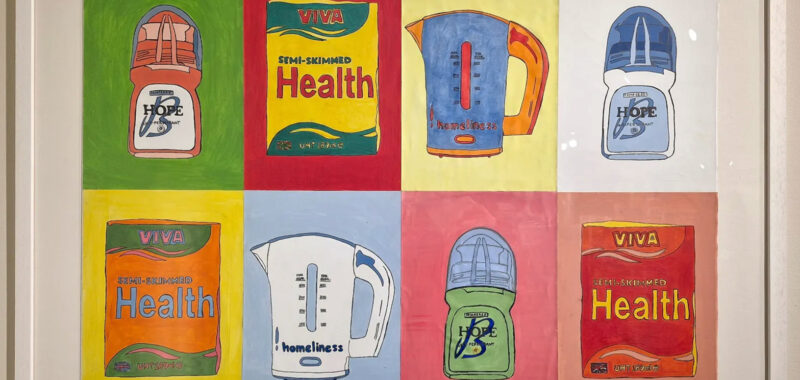LONDON — What is art if not a means to find a voice? Koestler Arts is a UK charity that gives public voice to those currently excluded from society: people in what it calls “secure settings” such as prisons, psychiatric hospitals, and children’s homes, as well as those on probation, community sentences, and youth offending teams. Co-curated by artist and Koestler longtime collaborator Jeremy Deller and formerly incarcerated artist John Costi, No Comment is an exhibition of artworks selected from 7,500 entries to the 2024 annual Koestler award, all created in criminal justice settings. Deller and Costi recruited six further guests to aid in the selection: Abbas Zahedi, Andrea Emelife, Larry Achiampong, Nicholas Cullinan, Jonny Banger, and Zakia Sewell. All works are for sale, with 50% of the proceeds going to the artist, 25% to Koestler, and 25% toward victim support.
The artworks run the gamut of emotions: hope, anger, despair. The pieces vary from simple and abstract or minimalist to complex politically charged themes or cultural motifs. Both lack of societal freedoms and limited materials and space give rise to unconstrained artistic expression. Using whatever is immediately available, the works on view are ungoverned by anything resembling a definitive style or school: air fresheners emblazoned with the words “mental health” or “reception” dangle on a string like a festive ornament in a work titled “Prison Is Despair”; a bra is embroidered with handcuffed fists on its cups (“Empowerment”). Elsewhere, an artist has carved a wooden menagerie from Jenga pieces. Some works are gut-wrenching: a ceramic piece, “Code Blue,” shows little paramedics attempting to revive a prone man; “Home Sick” is a drawing of a disembodied head floating in clouds and vomiting onto an idyllic thatched cottage below. In contrast, “3 Hs” depicts the mundanity of everyday life — health, homeliness, and hope — drawn on a kettle or deodorant stick.

None of the captions name the creator; we learn only their prison, facility, or program, and a reference number. Visitors may feel these artworks to be the voices of ghosts from our society, as if we are being spoken to from those temporarily (one hopes) removed from it. The enterprise has been launched as part of a rehabilitation program, to help individuals overcome their challenging environments. A crucial, and incredibly moving, element of this is encouraging visitors to give feedback to the artists. Cards are provided to write to the creator of a specific artwork, and the wall text states: “the impact of [this handwritten feedback] can be huge. Please write feedback for as many of your favourite artworks as possible.”
Given that this crucial aspect of the exhibition is to facilitate feedback — much needed validation and encouragement — toward those currently in the criminal justice system, it is a shame that the display is situated in a difficult to find corner of the Royal Festival Hall on London’s Southbank, inches from an excess of footfall. Perhaps cruelly, this mimics those who are so close to everyday society, and yet so far, lacking human connection.




No Comment continues at the Royal Festival Hall, Southbank Centre (Belvedere Road, London, England) through December 15. The exhibition was co-curated by Jeremy Deller and John Costi.

